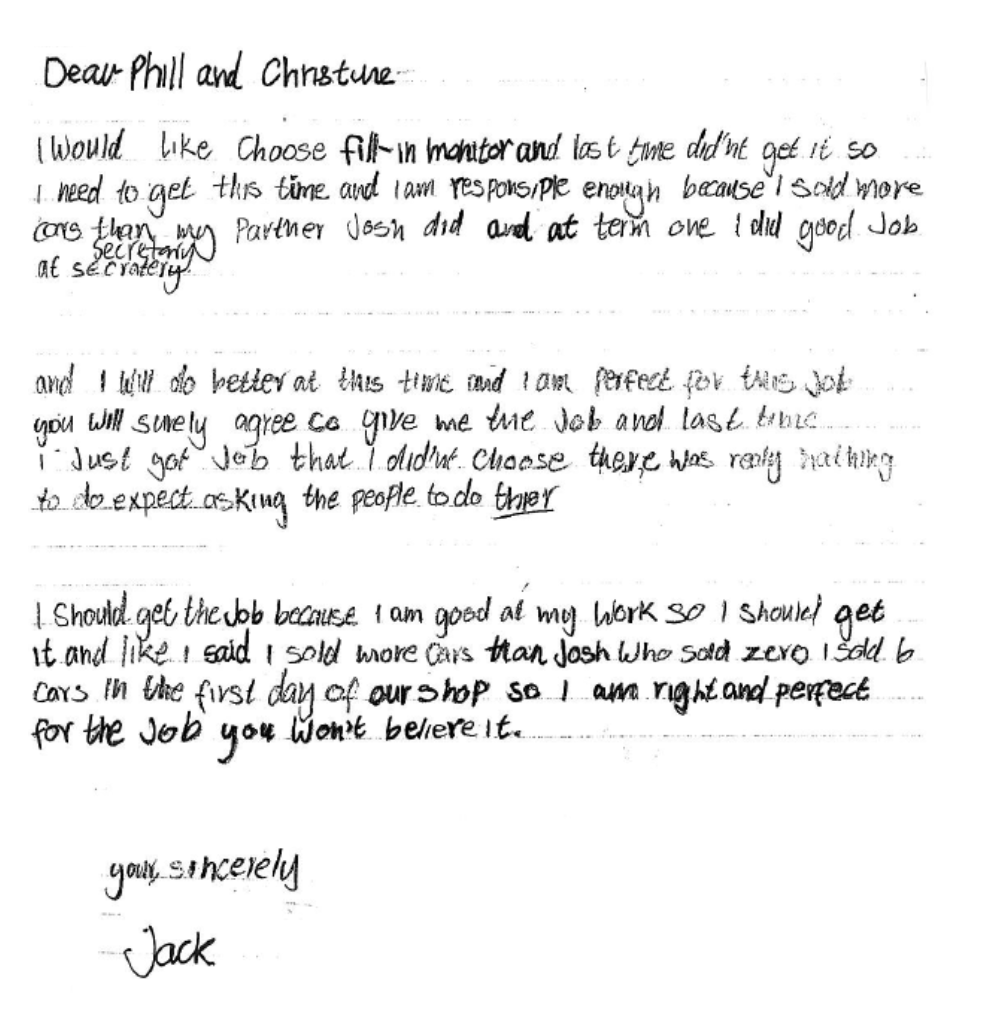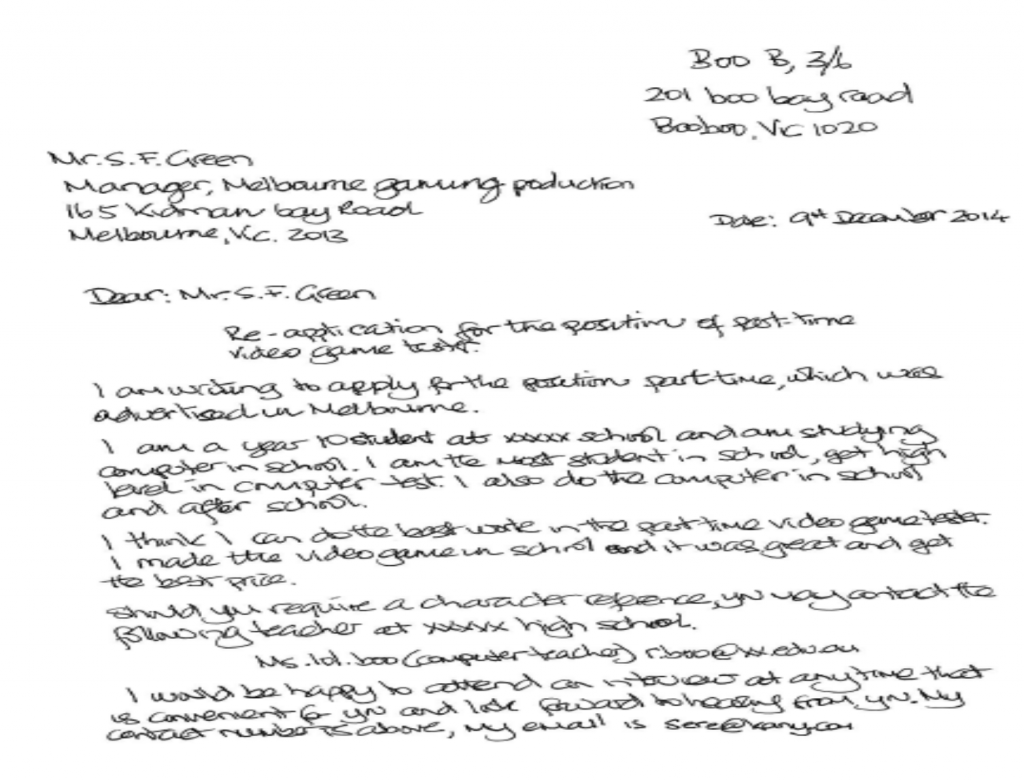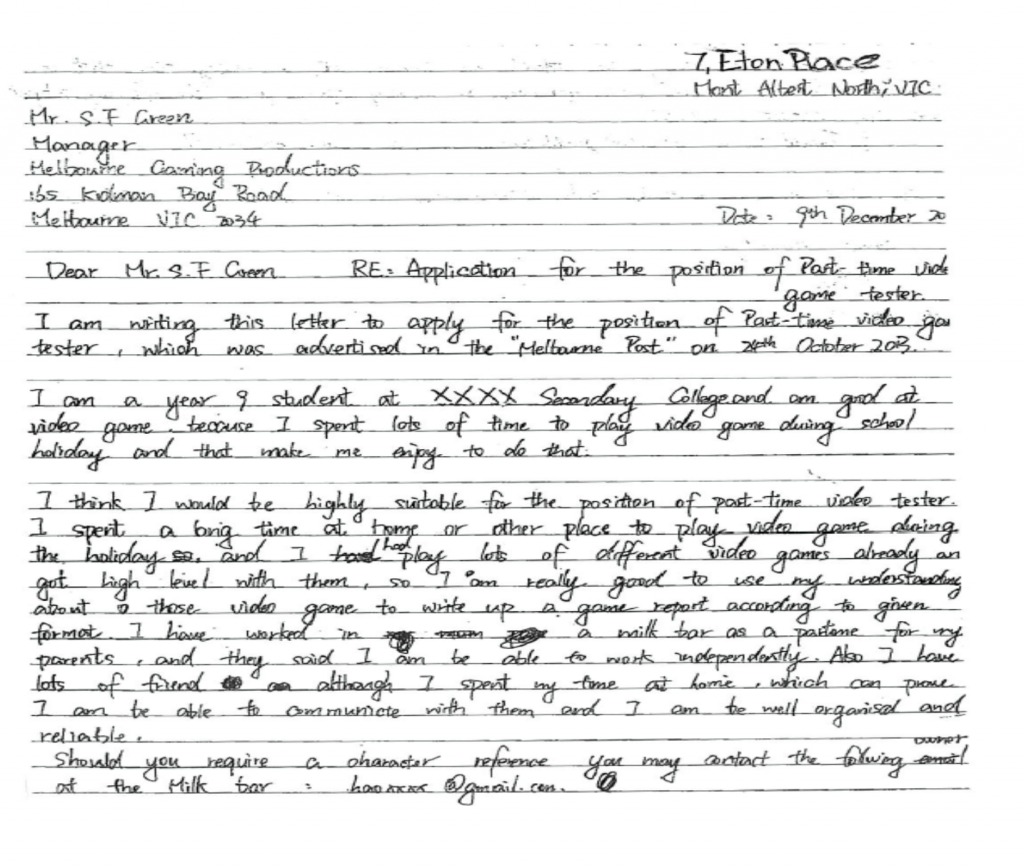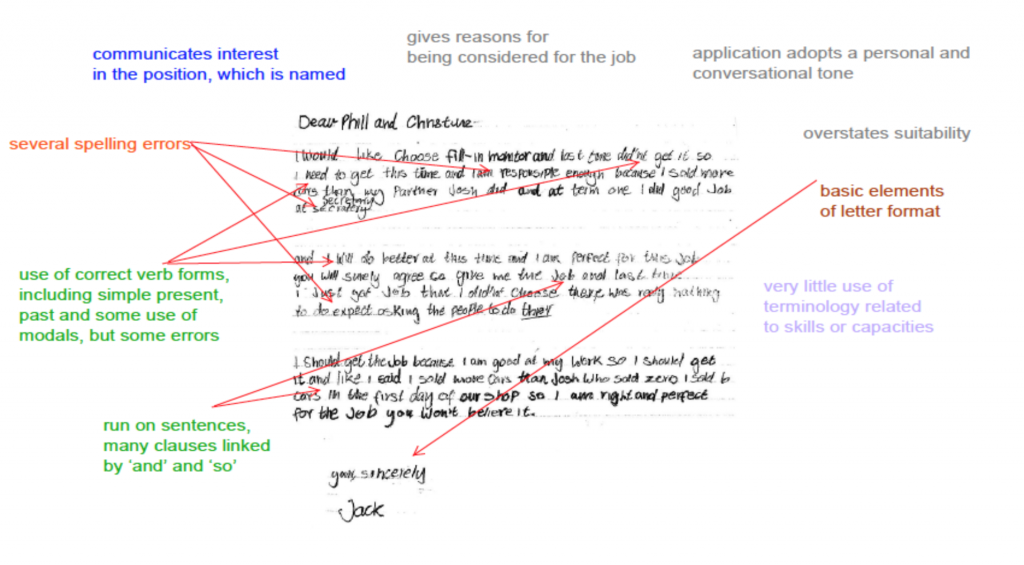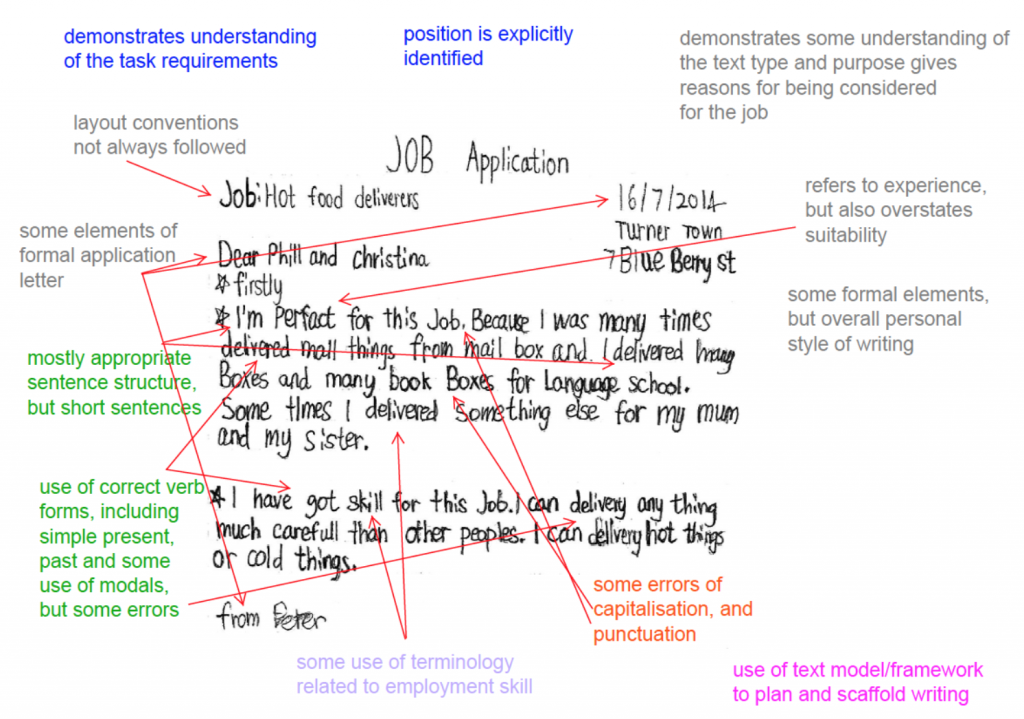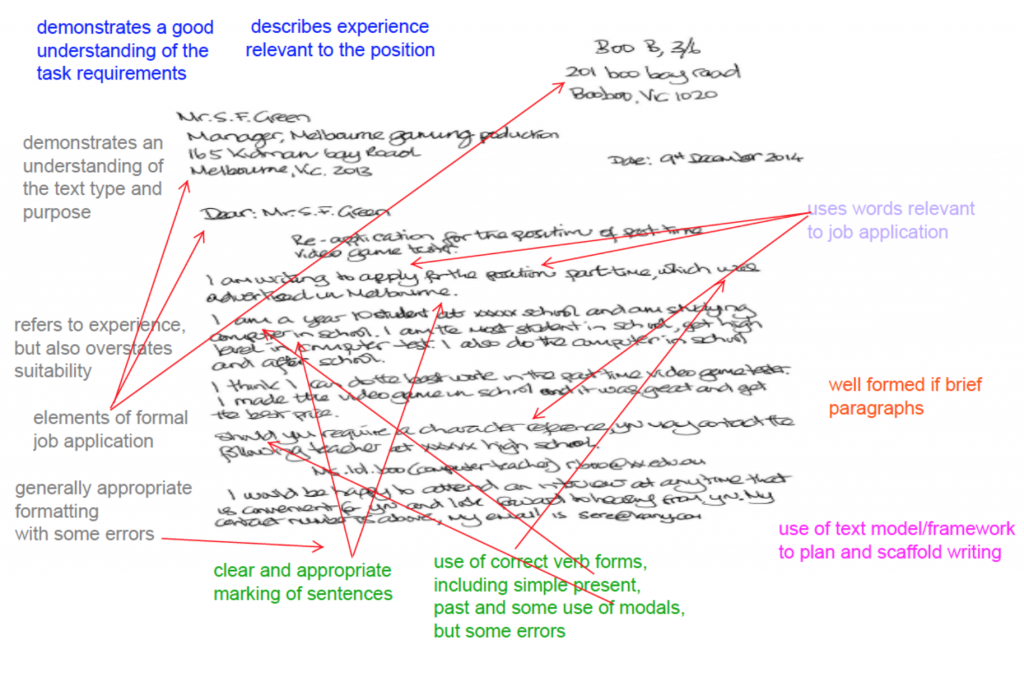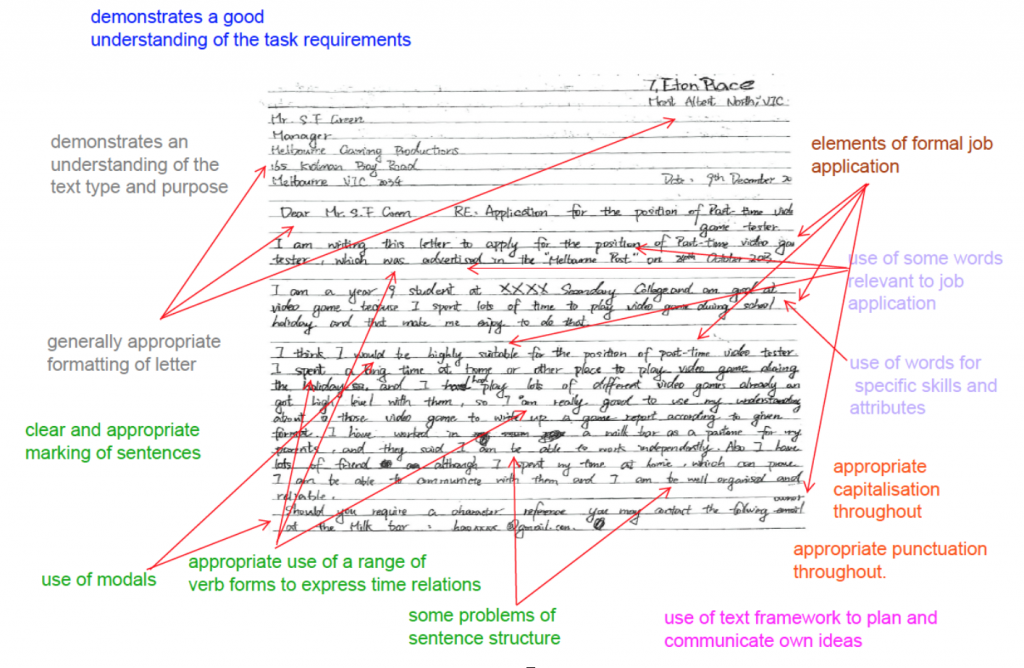11. Job application
Please click on the toggles below to navigate through information on this assessment task and reveal the links for downloading task materials.
Task details |
|
| Name of writing assessment task | Job application |
| EAL curriculum level range | B2, B3, C2, C3, C4 |
| Text orientation | Persuasive |
| Task type | Extended response |
Task specification |
|
| Purpose | To assess students’ ability to write a letter of application using the appropriate tone and adhering to a modelled generic framework. |
| Description | Students write a letter of application independently with reference to a given job advertisement. |
| Assumed knowledge and description |
|
Learning/teaching context |
|
| Language centre/mainstream class | EAL Support |
| Subject/key curriculum level objectives, outcomes | English |
| Topic/teaching unit | Occupations |
| Assessment conditions |
|
| Notes |
|
Task implementation |
|
| STAGE | ACTION STEPS |
| Pre-assessment activity |
|
| Assessment activity |
|
| Post-assessment activity |
|
TEAL Writing Task 11 – unmarked criteria sheet [PDF]
TEAL Writing Task 11 – unmarked criteria sheet [Word]
An explanation of the purpose, nature and use of criteria sheets is available at 4. Using the assessment criteria.
Nature and purpose of the task
The task assesses students' skills in formal written language in a 'real world' context that is not connected to the academic learning that is usually the focus of formal language in school contexts. It involves students relating themselves, their attributes and skills to a particular role (either in an imaginary workplace, or in some sort of role in the school). In that sense the task involves students in thinking about themselves, what they can do and the experience they may have that relates to what an employer or teacher might be looking for to fill a position. The task also involves sociocultural factors, as it involves presenting oneself in a positive light, without sounding boastful or overconfident. It can be related to learning related to developing self-awareness, or jobs and occupations.
It can be related to TEAL Oral assessment Task 21: A job interview role play.
Commentary
The four samples present a progression from a rather personal letter through to more competent examples of the formal job application genre. The students are still working on how to present themselves in ways that sound positive about their attributes but are culturally appropriate, not sounding overconfident or boastful. They are at varying stages of development in their ability to utilise linguistic resources to describe general attributes and specific experiences. The samples also represent different stages in the development of the ability to appropriately format a rather specific but very important text type in English.
Biographical information
Year: 5
Home language: Somali
Commentary
This student’s letter of application demonstrates an understanding of the task, but limited understanding of the text type and purpose. The letter is highly persuasive but the student has adopted a personal and informal, conversational tone rather than an impersonal businesslike tone. While it uses the basic format of the modelled letter, it is more like a personal communication than a business letter.
The student includes some of the basic elements of a letter: a greeting and a closing expression but does not include an address or contact details. Interest in the position is communicated and named: ‘Fill-in monitor’, and the student provides statements about their suitability for the position. A position of responsibility that the student has held in the past, and that has relevance to the job being applied for, is described. However, several of the reasons the student feels he/she should be considered are presented in personal terms: The student was overlooked last time; should get his/her choice this time; can do better than his/her partner. The student tends to overstate suitability for the job.
The student moves between simple present and simple past to refer to states that are currently true and to refer to past and completed events respectively. Modal verbs to express need, obligation and willingness are used accurately.
Although paragraphs are marked, the extent to which they mark different and complete ideas is not clearly signalled.
Sentences are not marked. Each paragraph is a long run-on sentence. There is little punctuation, except for some incorrect capital letters at the beginning of some words.
The marked criteria sheet shows that the student meets most criteria at Level 1 of performance.
The student’s language use in this task is consistent with the descriptions of students at Level B2, Victorian Curriculum F-10 EAL.
TEAL Writing Task 11 – criteria sheet – Sample 1
Using this assessment for further learning
(Select the points you think are currently of most importance to the student.)
Ask the student to comment on what he or she sees are the good things about the letter of application and how the text could be improved. Discuss ways the student might improve the text, discussing some of the issues raised below.
- Sentence structure: Ask the student to read the text aloud. When he or she pauses, explain that this indicates the end of the sentence. Add full stops and capital letters to show sentence punctuation.
- Sentence punctuation: Read the letter to the student and indicate by pausing where the full stops should go in his text. Ask him or her to add full stops. Once sentences are indicated by full stops, ask the student to identify where upper case letters should go to signal the beginning of a new sentence.
- Paragraph focus: Ask the student to point to the paragraph that says what job he or she is interested in, the one that says why he or she is interested in the job, and the one that summarises the end of the letter.
Ask the student to match the following topic sentences (explain the idea of a topic sentence) with each of the three paragraphs, and to insert them in the text.
I am writing to say I am interested in the position of ___________ this term.
There are a number of reasons why I would be suitable for this job.
To finish, I want to say why I should be considered for the job.
4. 'Tone' of a job application letter
Explain to the student that the purpose of a letter of application is intended to give the reader the information needed to help them make a decision about who gets the job so the letter should be factual and businesslike.
The letter should contain factual information about the student’s skills and prior experience that make that person suitable for this job, rather than personal reasons.
Ask the student to look at how the first personal statement has been changed into a sentence saying why he or she can do the job well. Ask the student to use the prompts in the table to write sentences that give reasons, to match some of the rather personal statements in the text.
|
Personal statement |
Giving reasons why I can do the job well |
| I am perfect for this job. | I have had other positions, which show that I can do this job very well. For example… |
| I sold more cars than Josh. | I did well when we had to sell cars, which shows that I can… |
| I did a good job as secretary. | I did a good job as secretary, which shows that I can… |
Give the student time and support to write up another draft to see if they can improve on the selected issues above and add the final draft to their portfolio.
Biographical information
Year: 5
Home language: Korean
Commentary
This sample shows an understanding of the task and some understanding of the text type and purpose. The student has attempted to follow the conventions for the content and layout of a formal job application. The position being applied for, a contact address and the date, a greeting and a form of closing expression have all been included. The student has outlined relevant skills and previous experience. Layout conventions are not always adhered to: the address of the people being applied to, and his or her own contact details need to be included. A more formal closing expression should be used.
The student has chosen to highlight relevant details using dot points (stars). This certainly draws attention to the key information however the style is not appropriate in a formal letter of application.
While sentences are generally well constructed, there are some issues with tense, expressing causal relations and the use of adverbs.
While some relevant terminology, such as skills is used, some language is still colloquial, I get the high levels…. There are some errors of capitalisation and punctuation, and some spelling errors.
The marked criteria sheet shows that the student meets a most of criteria at Level 2 of performance.
The student’s language use in this task is consistent with the descriptions of students at Level B2, Victorian Curriculum F-10 EAL.
TEAL Writing Task 11 – criteria sheet – Sample 2
Using this assessment for further learning
(Select the points you think are currently of most importance to the student.)
Ask the student to comment on what he or she sees are the good things about the letter of application and what could improve the text in any way. Discuss ways it could be improved, discussing some of the issues raised below.
- Using ‘because’
- Ask the student to look at the following based on his text: I am well suited to this job because I have experience with delivering things.
- Ask the student find the sentence or sentences in his text that expresses similar ideas. Point out the way that because is used to connect the ideas and give a reason for the statement, and discuss how this is different from the way the student constructed the sentences.
- Ask the student to use the table below to write three sentences he could use to improve the letter.
|
I have the skills for this job because |
I can deliver things more carefully than other people. |
| My mother and sister sometimes ask me to deliver things for them | I have a lot of experience delivering things. |
| I would be good at this job | I can deliver hot and cold things. |
2. Adjectives and adverbs
- Discuss this table with the student, and explain how the word in colour is the one the adjective or adverb is talking about:
| Adjective (says something about a thing) | Adverb (says something about an action) |
| careful (e.g. a careful person) | carefully (e.g. He opened the door carefully) |
- Now use the right word to fill in the gap in the following sentences:
- I am a ________________________ delivery person.
- He ______________________ carried the pizzas he was delivering.
- He wasn’t driving ______________________ when he crashed into the tree.
3. Formatting a job application
|
Your address Date Person’s name and position Their business and address Re: Job application for ____ Dear _____, XXXXXXXXXXXXXXXXXXXXXXXXXXXXXXXXXXXXXXXXXXXXXXXXX XXXXXXXXXXXXXXXXXX XXXXXXXXXXXXXXXXXXXXXXXXXXXXXXXXXXXXXXXX XXXXXXXXXXXXXXXXXXXXXXXXXXXXXXXX Yours sincerely, / Yours faithfully, Signature |
- Draw the student’s attention again to the model framework of a business letter. Ask him or her to identify where different information belongs in the template, particularly the address, the title of the position, the closing expression and the signature.
- Give the student time and support to write up another draft to see if he or she can improve on the selected issues above and add the final draft to his or her portfolio.
Biographical information
Year: 9
Home language: Korean
Commentary
This sample demonstrates that the student has understood the task requirements and the text type and purpose. He has followed most of the conventions for the content and layout of a formal job application. He includes the address of the company he is applying to, his own address and a date as well as a clear statement of the position being applied for and a greeting but no closing expression. He provides contact details and that of a referee. He needs to include the full name of the source of the advertisement. He has outlined relevant skills and previous experience, though his writing would be strengthened by further elaboration.
He has put formulaic sentence starters modelled by the teacher to good use. His sentences generally follow the subject-verb-object or subject-verb-complement pattern though he needs to work on selecting the verbs he needs to express his intended meaning more formally: I get a high level in the computer test, I also do computer in school, I think I can do the best work, and selecting adjectives he needs in superlative forms: I am the most ….. student in school.
He has used some of the terminology related to employment but again his writing would be strengthened by using phrases such as:
I am good at…, I can…. to more fully describe his skills
His letters are well formed and the text is appropriately punctuated with full stops marking the end of sentence units and upper case letters being used to signal the beginning of new sentences. He has divided his text into appropriate paragraph units to signal: Introduction, qualifications, experience, stating his willingness to attend an interview and providing contact information.
The marked criteria sheet shows that this student sample meets criteria at Levels 2 and 3 on the criteria sheet.
The student’s language use in this task is consistent with the descriptions of students at Level C3, Victorian Curriculum F-10 EAL.
TEAL Writing Task 11 – criteria sheet – Sample 3
Using this assessment for further learning
(Select the points you think are currently of most importance to the student.)
Ask the student to comment on what he sees are the good things about his letter of application and if he thinks he could improve the text in any way. Discuss ways he might improve his text, guiding him to discussing some of the issues raised below.
- Using more formal language:
- Ask the student to look at the examples below from his text and see if he can identify more formal ways of expressing these ideas.
|
Example from text |
More formal language |
| I am the most ….. student in school | I am _______________ in the school in computer studies |
| I get a high level in the computer test, | I ______________a high grade in the computer test |
| I also do computer in school and after school, | I ____the computer in school __________and _______information. I also ________ the computer at home _______ games |
| I think I can do the best work in the part-time video game tester…. | I am ___________to ____________video game tester |
| I made a computer game at school | I ____________ a computer game at school |
|
A. for studying B. well suited C. one of the best students D. achieved E. to play |
F. working as a G. use H. use I. finding J. developed |
2. Talking about skills
- Encourage the student to go into more detail about the skills he/she is good at with reference to computer skills and being a video game tester:
I am good at: keyboarding, using Word, playing different kinds of games, writing notes, communicating with people etc.
I can identify what is good and bad about a game.
I can write useful notes.
- Give the student time and support to write up another draft to see if he/she can improve on the selected issues above and add the final draft to their portfolio.
Biographical information
Year: 9
Home language: Chinese
Commentary
This student demonstrates that he has understood the requirements of the task, the text type and purpose. He has communicated his interest in the position which is clearly identified and has included references to his attributes and experience relevant to the position he is applying for. He has adopted an appropriately formal tone for his letter and has made good use of the formulaic phrases presented in a model text as part of the scaffolding for this task. The letter generally follows the expectations related to the content and formatting of a letter of application.
A range of sentence types, adjectives and adverbs are used. However, there are some noticeable problems with the construction of some sentences, including a tendency to make them too long: I spent a long time at home on holiday, and I had play lots of different video games already and got a high level with them, so I am really good to use my understanding about those video game to write up a game report according to given format.
There are also some problems with verb phrases, including some tense errors: I had play and I spent.. and that make.., the unnecessary insertion of be in some verbs relating to the writer’s abilities I am be able to communicate; I am be well organised. The letter has a respectful tone, and suggests the student is interested in the job.
The marked criteria sheet shows that this student sample meet the criteria for level 3 of performance of the task.
The student’s language use in this task is consistent with the descriptions of students at Level C3, Victorian Curriculum F-10 EAL.
TEAL Writing Task 11 – criteria sheet – Sample 4
Using this assessment for further learning
(Select the points you think are currently of most importance to the student.)
Ask the student to comment on what he sees are the good things about his letter of application and if he thinks he could improve the text in any way. Discuss ways he might improve his text, guiding him to discussing some of the issues raised below.
- Sentence structures
Explain the following to the student:
- A sentence is a unit of grammar in which complete ideas are expressed.
- Simple sentences contain a single idea, and have a simple grammar, for example, I played a lot of video games on holiday. I got to a very high level on many games.
- Complex sentences contain a number of ideas, and use some different grammatical structures to connect the ideas.
- Look at the different ways these two simple ideas can be connected.
- I played a lot of video games on holiday and I got to a very high level on many games. (Joining two connected ideas)
- I played a lot of video games on holiday and so I got to a very high level on many games. (One thing caused the other)
- Because I played a lot of video games on holiday, I got to a very high level on many games.
- I got to a very high level on many games because I played a lot of video games while I was on holiday.
- If sentences become too long or contain too many ideas it can become confusing for the reader. It is better to keep sentences shorter, so they contain no more than two or three ideas.
- For example,
- I spent a lot of time playing computer games on holiday and so I am now better at playing computer games. (2 ideas)
- Because I spent so long playing games on holidays, I became good at them and I am now better at playing many games. (3 ideas).
Ask the student to look through his text, and identify the number of ideas contained in each sentence. Ask him to find sentences that contain three main ideas, and to re-write them so that they contain no more than two main ideas. If any sentences contain more than three ideas, ask him to rewrite them in shorter sentences, which contain no more than two main ideas.
(Make sure the student identifies the problem with the first sentence of the third paragraph.
2. Describing your experience, skills and capacities
- Using present ‘perfect’ (the verb ‘to have’) or simple past tense (ending verbs with ‘-ed’ or equivalent such as ‘went’ for things we have done in the past.
- When we talk about things we have done at a specific time or place, we use simple past.
- During the holidays I played a lot of computer games: I wrote reviews of three computer games in last month’s computer club magazine.
- When we talk about our past experience in a way that is relevant to the present, but the time or place is not mentioned or important, we use the ‘present perfect’ which means we use the verb ‘to have’ and a particular form of the verb to describe this.
- I have played many computer games: I have written 25 reviews of computer games.
Ask the student to write sentences about experience at a particular time and place, and sentences about things he has done at an unspecified time in the past. See if he can put the sentences about the experience in the column that is appropriate.
|
Experience |
Simple past |
Present perfect |
| Write/review of ‘World of Warcraft’/my computer studies assignment | I have written a review of ‘World of Warcraft’ for my computer studies assignment. | |
| Play/‘World of Warcraft’/long time/summer holidays | In the summer holidays, I played ‘World of Warcraft’ many times. | |
| Play/games on an X-box | ||
| Play/games on an X-box/at my cousin’s house last week | ||
| Write/instructions for a game on Android devices | ||
| Write/instructions for a game on Android devices/when my cousin got a new Android tablet. |
Ask the student to review their letter of application and to check the tenses they have used for their past experience and make any corrections that are needed.

